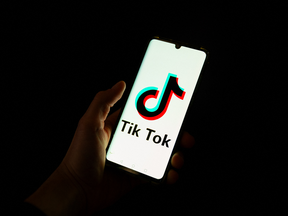Short video platform has until Sunday to shutter its U.S. operations or find a buyer
Article content
The United States Supreme Court upheld a law banning TikTok on Friday, meaning the short video platform has until Sunday to shutter its U.S. operations or find a buyer. The law calling for the closure or sale of the Chinese-controlled social media app — which has more than one billion monthly active users worldwide, including 170 million in the U.S. and 14 million in Canada — was passed in April. Last week, the U.S. Supreme Court began hearing arguments from the company’s legal team, which was hoping to overturn the ban. Prior to Friday’s ruling, TikTok had insisted it is unwilling to sell and will shut down in the U.S. The Financial Post’s Yvonne Lau explains the ban and what it will mean for the millions who use the platform, both in the U.S. and in Canada.
Advertisement 2
Article content
Article content
Article content
Why is the U.S. banning TikTok?
In April, U.S. President Joe Biden signed a bipartisan bill into law that would see TikTok banned in the country unless its parent firm, ByteDance Ltd., a Chinese tech unicorn worth US$300 billion that is among the world’s most valuable private companies, gives up control within a year. American lawmakers have voiced growing concerns over TikTok’s threats to U.S. national security amid an intensifying U.S.–China tech war, with some in Washington arguing that TikTok could potentially funnel American user data to the Chinese government or that Beijing could use the app to spy or as an access point to embed Chinese malware on U.S. devices. TikTok has insisted that it has never provided user data to the Chinese government and would refuse to do so if asked, but that has not allayed concerns in the U.S.
TikTok’s legal team argued that a ban would have a “staggering” impact on the free speech of its American users, but the top court disagreed. “Congress has determined that divestiture is necessary to address its well-supported national security concerns regarding TikTok’s data collection practices and relationship with a foreign adversary. We conclude that the challenged provisions do not violate petitioners’ First Amendment rights,” the court said in its ruling.
Article content
Advertisement 3
Article content
Could the ban be delayed or reversed?
Despite concerns about the app, there are some who would prefer to delay the ban, with incoming U.S. president Donald Trump chief amongst them. Trump, who will be inaugurated a day after the ban is slated to begin, has signalled through advisers that he is keen to avoid a shutdown. Mike Waltz, Trump’s incoming national security adviser, told Fox News prior to the court ruling that the new administration will find a way to “preserve” TikTok while safeguarding user data and TikTok chief executive Shou Zi Chew is expected to attend the inauguration, according to reports.

Some Capitol Hill policymakers are also now trying to buy more time to broker a TikTok sale to a U.S.-approved buyer. Democratic lawmakers including Senator Ed Markey and Cory Booker introduced legislation on Thursday to push back the Jan. 19 deadline, citing the “serious consequences” for millions of Americans and their businesses if TikTok were to shut down.
While TikTok has repeatedly said it refuses to sell the U.S. operations, several potential buyers have thrown their hat in the ring, including former Los Angeles Dodgers owner Frank McCourt and Canadian investor Kevin O’Leary. Some have also pegged Elon Musk as TikTok’s potential saviour, given his close ties to Trump and his chumminess with China, though TikTok has brushed off those rumours as “pure fiction.”
Advertisement 4
Article content
What is Canada’s stance on TikTok?
Ottawa has come out swinging at TikTok in recent years, ordering a review of the company through the Investment Canada Act (ICA), which allows the federal government to investigate foreign investments that could jeopardize national security. In February 2023, Canada banned the app from all government-issued devices after the country’s chief information officer found that the platform “presents an unacceptable level of risk to privacy and security.” By November 2024, Ottawa, citing national security risks, ordered TikTok Technology Canada Inc. to shut down its Canadian offices and operations — while allowing the app to remain usable and available for download for Canadian users.
TikTok’s case is rare and “a big deal,” said a senior partner at a Toronto law firm who asked not to be named because their firm represents other social media platforms. “To have a company wind-up its business operation on Canadian soil is a draconian approach (that is) not taken lightly,” he said. “You’re unscrambling the eggs, because they’ve already established an operation here, hired people and are contributing to the economy.” TikTok is challenging the government’s order and filed for a stay in Vancouver’s federal court last December. For now, TikTok’s Canadian offices in Toronto and Vancouver remain operational and employ hundreds.
Advertisement 5
Article content
What does a potential U.S. ban mean for Canada?
If the U.S. follows through with the ban on TikTok, “Canada will be hard-pressed not to take similar action,” said Vivek Krishnamurthy, director of the University of Colorado Boulder’s Technology Law and Policy Clinic and former law professor at the University of Ottawa who recently served on Canada’s online safety expert advisory group. Even if Ottawa abstains from a full ban, a U.S. ban means that Canadian users could experience a “degraded version” of TikTok, he said. “I would expect that a significant percentage of TikTok Canadian traffic is served from infrastructure in the U.S. It seems to me that if TikTok goes dark in the U.S., Canadian users are likely to feel an impact.” The Canadian government has not commented on the U.S. bill or announced any similar action. TikTok Canada declined to comment but confirmed that the app remains available in Canada.
Recommended from Editorial
Advertisement 6
Article content
Who stands to benefit from a TikTok ban?
TikTok’s social media competitors — both U.S. and Chinese-owned platforms — stand to win from a U.S. ban. Alphabet Inc., which owns YouTube, and Meta Platforms Inc., which owns Instagram and Facebook, alongside Snap, and X, could be poised for advertising windfalls in the billions should TikTok become unavailable in the U.S., according to a Wednesday Financial Times report. Chinese social platforms such as RedNote and Lemon8 have experienced a surge of new users in recent days, with the latter signing up millions of new users this week.
• Email: ylau@postmedia.com
Bookmark our website and support our journalism: Don’t miss the business news you need to know — add financialpost.com to your bookmarks and sign up for our newsletters here.
Article content
TikTok ban and what it means for Canadians
2025-01-17 15:56:27




